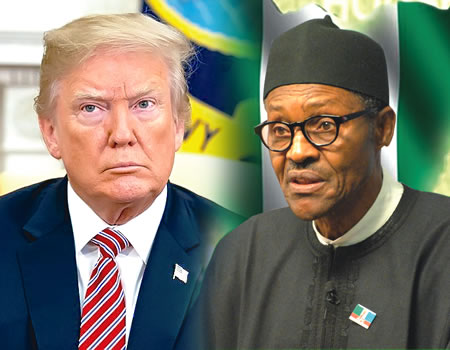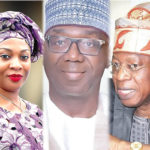ONE nagging source of frustration with the Muhammadu Buhari administration is that it is often difficult for an impartial observer to divine what exactly its ultimate strategy is, where to draw the line between a diplomatic wait-and-see game and sheer incompetence, and how to differentiate between bluffing and utter cluelessness. The latest face-off with the United States government over fees for visa applications provides the umpteenth demonstration of this perennial confusion.
To put the latest fiasco in context, we must go back to President Donald Trump’s January 2017 executive order, in particular Section 9 regarding American resolve to become more strict on visa fees, processing and validity period. Here is the relevant passage in full: “The Secretary of State shall review all non-immigrant visa reciprocity agreements to ensure that they are, with respect to each visa classification, truly reciprocal insofar as practicable with respect to validity period and fees, as required by sections 221(c) and 281 of the INA, 8 U.S.C. 1201(c) and 1351, and other treatment. If a country does not treat United States nationals seeking non-immigrant visas in a reciprocal manner, the Secretary of State shall adjust the visa validity period, fee schedule, or other treatment to match the treatment of United States nationals by the foreign country, to the extent practicable.”
Judging by the foregoing, America was basically saying that it was ready to play the tit for tat game when it comes to the cost of entry visas for its citizens seeking entry into other countries. To be precise, it was putting the Nigerian authorities on notice, considering that, at the time of the executive order, Americans applying for entry visas into Nigeria paid more than Nigerians applying for equivalent visas to enter the United States. By May this year, there was still no change in the status quo, which probably explains the US embassy’s indefinite suspension of interview waivers for visa renewals (aka “drop-box”) for Nigerian applicants. Last week, the Trump administration finally decided to impose a “reciprocity” fee for all approved non-immigrant visa applications by Nigerians. The said reciprocity fee (ranging from $80 to $303) is in addition to the regular visa application fees.
Yet, hardly had the Trump administration announced the new visa reciprocity regime when the Federal Government made it known that it had approved a reduction in visa charges payable by US citizens from $180 to $150. Which raises the following questions: why now? Why did the Federal Government have to wait until the Trump administration’s announcement of a reciprocity fee before deciding to cut visa charges payable by US citizens? Apparently anticipating public condemnation, spokesman for the Ministry of Interior, Mohammed Manga, explained that the report of a committee set up to “conduct due diligence in line with the ministry’s extant policy on reciprocity of visa fees” had been held up by “transition processes in the ministry at the policy level.” Manga’s vague and unconvincing excuse fails to explain why it took more than two years to respond to a warning that was first issued in January 2017, and repeated at least two times after.
To be sure: we are not riding shotgun for the Trump administration, and we quite agree on its hostility towards immigrants, especially those immigrants from countries the American president was reported to have once gracelessly described as “shithole countries.” But this is not about that. President Trump is entitled to negotiate fair terms of engagement for his country, and this is what he was doing with the reciprocity order.
Which makes it all the more confounding that the Nigerian authorities dawdled and slumbered for so long, before eventually doing what should have been evident from the get go: impose no undue financial burden on American applicants for Nigerian entry visas. In awkwardly reversing itself less than24 hours after the US government finally decided it had had enough, the Federal Government, not for the first time, folded under pressure that it had unduly brought upon itself, and gave the impression that it had not seriously applied itself to the task at hand. For the sake of Nigerians who are desperately yearning for greater sophistication in governance, the Federal Government needs to raise its game.






